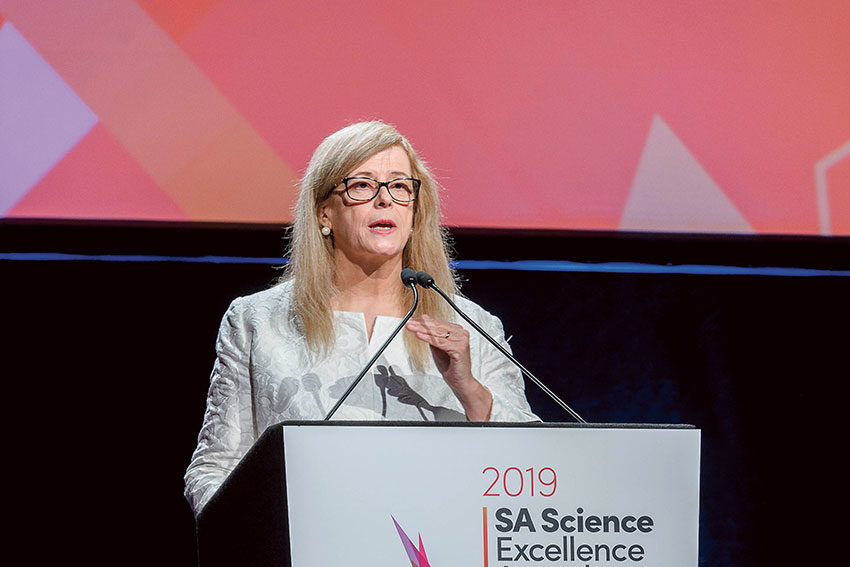South Australia’s Chief Scientist Caroline McMillen on how to take Adelaide into the future

Professor Caroline McMillen knows first-hand how a university can help reinvent a city.
After seven years at the helm of the University of Newcastle in NSW’s Hunter region, McMillen was handed the key to the city by the Lord Mayor in acknowledgement of her role in helping to transform it from rustbelt to a thriving hub of new ideas and innovation.
Now, 10 months into her three-year term as South Australia’s Chief Scientist, she believes Adelaide is ripe for similar treatment following the departure of the auto industry.
“When the opportunity first came up, I walked the streets of Adelaide and there was a different buzz from when I lived here seven years ago. I think we’re on the journey to become a place of great innovation,” she says.
Newcastle’s renaissance was “a tough journey across tough times” but one that taught valuable lessons in how to build a truly innovation-friendly, productive society.
“You needed to have strong, joined-up civic industry and academic leadership,” says McMillen. “You needed a university – not necessarily up there in the top 100, but with some really deep specialist knowledge and specialist facilities – which could be used as a base for building the next industries. Patient capital, some patient investment, and the infrastructure.”
Adelaide, she reckons, has all of those things. “All research-intensive universities operate in a global domain. There are no knowledge boundaries. The communities of scholars and the transfer of knowledge between them, and the testing of each other, is the asset they have in North Terrace and at Flinders.”
And so the tram ride along North Terrace between UniSA and SAHMRI at one end and the University of Adelaide at the other, and the train ride to Tonsley innovation district – and next year to Flinders University – are also not only journeys but “innovation catalysts”.
“We have our proximity and connectivity. Our challenge is to make sure we harness it.”
Which leads to another concept that drives McMillen’s vision for the future of Adelaide and South Australia: “magnet cities”, those adept at pulling in new residents, visitors and business investment for the benefit of all.
“You need 25- to 40-year-olds, maybe in the creative industries, maybe in start-up businesses, maybe working in science, health, IT,” says McMillen. “When they’re down the laneways having coffee or a craft beer, it’s a conversation about the future.”
In Newcastle she was known for her ability to engage with industry and establish innovation hubs that drove collaboration between companies, start-ups and investors.
“It’s all about how you harness your resources in a value chain to support a growth agenda,” she says. She ticks off the state’s potential growth sectors.
“Food, wine and agriculture, health, advanced manufacturing and defence. Renewable technology is a major priority area for us and mining and minerals still remains a big part of the mix.
“Those industry sectors where we already have strengths and are powering through, and those that are emerging.”
In all this it is not the Chief Scientist’s role to explain the science, she says. There are plenty of businesses and government agencies equipped to understand the new, emerging knowledge. “What I’m looking for are the enablers of the ecosystem. Do we have the talent? Do we have global innovators? Have we got the right world-class infrastructure?”
So far she has asked more questions than she has answered, listening and learning from the people who are leading knowledge creation and its application. “You can do that quickly but it’s at your peril. Your objectives have to be pretty grounded, otherwise you can get a program of activities rather than a linked strategy.”
The next phase of her job is to make sure that knowledge creation is aligned to the government’s growth agenda, including plans to develop Lot 14, SAHMRI 2, and other distinctly Adelaidean assets like the Waite Campus and Tonsley.
“This is a government that understands a challenge, and the role that STEM plays. And there is plenty to make Adelaide a magnet city.
“You can’t create that with a logo. But I know, having heard many a graduate speak, the future is in such good hands. It’s going to be different, and I think Adelaide’s up for that.”